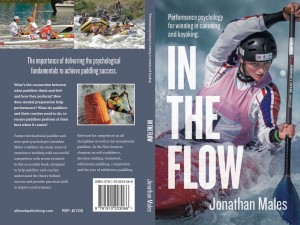Mental Warm Up
- In the Flow: PERFORMANCE PSYCHOLOGY FOR WINNING IN CANOEING AND KAYAKING
The importance of a mental warm up
Every competitor knows that it’s necessary to physically warm-up before a race. But how many pay as much attention to their mental warm-up as they do to stretching their body, loosening their muscles and increasing their heart rate? The best racers have a consistent routine that prepares body AND mind for the challenge ahead. And they practice this routine during training sessions, not just on race day.
Here are some ideas that will help you develop your own mental warm–up routine.
1. Deal with distractions
It’s hard to race when your mind is full of the normal tasks and concerns of daily life. I remember one paddler complaining that he was thinking about the shopping list while doing full-length slalom runs! So before a race or training session give yourself the time to deal with any distractions and put them to one side. A simple technique is to write a ‘to do’ list, getting everything out of your head and onto a piece of paper. Then put the list away somewhere safe with a promise to return to it after the session.
2. Be clear about your intent
Give yourself time to sit quietly, relax and visualize what you want to achieve from the race or training session. The clearer you are about your intent, the more likely you are to achieve it. And if you can see, feel, and hear yourself performing the way you want before you start, so much the better.
“I was thinking about the race and how I was going to race it. Stay to my race plan, not getting distracted by the other athletes. I also remember telling myself that this race is what I’ve been waiting for, time to find out how good I really am.”
Eirik Verås Larsen, 2012 K1 1000m Olympic champion 1
3.Understand the transition to your competitive mind
This is also a good time to notice your own thoughts and feelings. Competing strongly means that you are tapping into your Mastery Motivation, aspiring to be strong and focusing your energy on being in control. This is like a warrior going into battle – in fact one athlete I worked with used to talk about mentally ‘putting on a suit of armor’ before he competed. This focused state of mind is ideal for competition or training but it can be unproductive in your normal life, when it is often necessary to be considerate and kind to other people. In fact people who are too extreme in their mastery motivation in normal life can come across as insensitive or even ruthless.
So your warm-up routine helps you transition to a mastery state of mind. Team sports players call this ‘putting their game face on’. Although this is easy for some people, others will need to take some time to tune out of normal social interactions, remind themselves of what it feels like to paddle hard and why the race or training session is important. This is particularly important to get yourself ready for the pain of competing to your maximum. You need to be ready to be tough with yourself, the course and your competitors.
Remind yourself of your different sources of self-confidence – these typically include high quality training, having good equipment, trusting your coach, and knowing from experience that you can deliver. Imagery can help too. Get creative and experiment with different mental images of yourself feeling strong and confident.
4. Mentally warm-down too
After a race or training session you need to transition back to normal life. This is the reverse of warming up – you need to use your Decision Making skills to review your performance and whether or not you achieved your goals, so you can take the lessons forward to the next event. If it’s been a big event, it’s likely that you’ll feel strong emotions – either joy or disappointment. Emotions are natural and it’s important to acknowledge them before you return to your ‘to do’ list and take some practical steps to keep your life in order. And you can reverse from a mastery motivation to a more open state of mind, in which you no longer need to be so tough with yourself and other people.
1 http://www.sportscene.tv/flatwater/canoe-sprint/news/interview-with-multiple-olympic-champion-eirik-veras-larsen
















